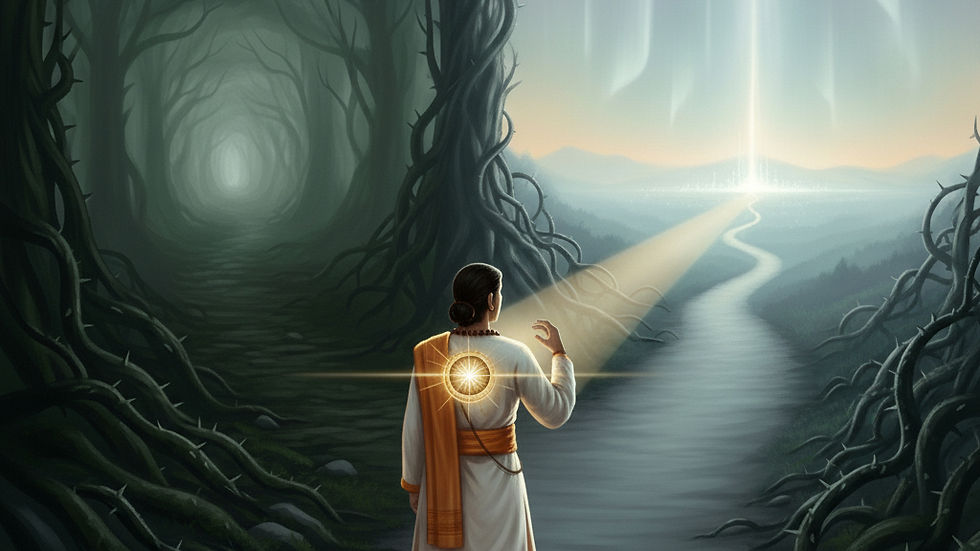Human Life Is Incomplete Without Nature Conservation
- H.H. Raseshwari Devi Ji

- Aug 9
- 4 min read
Updated: Sep 10

Introduction: More Than Just Greenery
Look around. The air you breathe, the water you drink, the food on your plate — all come from nature. Yet, in the rush of urban life and technological advancement, we often forget a simple truth: human life and nature are inseparably linked. Conservation is not a luxury, a weekend cause, or a hobby for activists — it is a necessity for our survival and evolution. This article explores why conserving nature is not just about protecting trees or wildlife but about completing the circle of life we’re all part of.
Why Human Life Depends on Nature
Nature support life. Nature support life.To understand the weight of this statement, ask yourself: what happens if forests disappear? If rivers run dry? If soil turns barren? The answer is not philosophical — it’s biological, social, and economic collapse.
Nature provides:
Air through trees and oceans
Water through rivers, glaciers, and rainfall systems
Food through biodiversity and soil fertility
Medicines — 80% of the world’s population still relies on traditional, plant-based medicine
But beyond these material needs, nature offers something else — mental peace, emotional stability, and spiritual grounding. Studies show that even a 15-minute walk in a green space lowers cortisol levels and improves mood.
A Systemic Chain: Break One, Break All
A powerful insight from the Taittirīya Upaniṣad puts it clearly:
“Dharmasya mūlam arthaḥ, arthasya mūlam rāṣṭram, rāṣṭrasya mūlam pṛthivī...”
The root of dharma is wealth, the root of wealth is the nation, the root of the nation is the Earth.
This isn’t a spiritual metaphor — it’s a policy framework. When we pollute our Earth, we destroy the economy. When economies fall, societies weaken. And when societies weaken, human values collapse. That’s why nature conservation is not an environmentalist's issue — it’s everyone's issue.
Real-World Evidence: What the Numbers Say
13 million hectares of forest are lost every year globally
1 million animal and plant species face extinction due to human activity
Air pollution kills 7 million people annually
The UN estimates $44 trillion — over half of global GDP — is moderately or highly dependent on nature
The message is loud and clear: our future hinges on how we treat the environment today.
A Call to Responsibility: Complete the Circle
We are not outsiders to nature — we are a part of it. Ignoring this fact is like cutting off oxygen to your own lungs. Every act of conservation — whether planting a sapling or voting for eco-friendly policies — is not just a good deed. It’s a moral and strategic investment in humanity’s continuity.
Let us not wait for disaster to strike before we act. Let's conserve, because the Earth is not just our resource — it is our foundation.
Conclusion
Human life, in its truest form — fulfilled, balanced, and meaningful — is not possible without honoring and protecting the natural world. As the ancient scriptures remind us:
“Yat pṛthivyāṁ śritaṁ kiñcit, sarvaṁ tvayā dhāritam”—
Everything that exists upon this Earth is sustained by You, O Nature.
— Atharva Veda
We owe our lives to nature — not in a poetic sense, but in a practical, everyday reality. Conservation isn’t about charity. It’s about completing ourselves.
With reverence and responsibility,
Radhe Radhe,
— Raseshwari Devi Ji
Further Reading:
(Environmental Role: Responsibility and Stewardship)
“मानव जीवन में प्रकृति का महत्व” (Importance of Nature in Human Life)
“जीवन में पर्यावरणीय जिम्मेदारी” (Environmental Responsibility in Life)
“मानव जीवन और वृक्षों का महत्व” (The Value of Trees in Human Life)
“प्रकृति के साथ सामंजस्य: मानव का धर्म” (Harmony with Nature: A Human Duty)
“प्रकृति संरक्षण के बिना मानव जीवन अधूरा है” (Human Life Is Incomplete Without Nature Conservation)
Frequently Asked Questions: Nature Conservation & Human Life
Q1. What does “nature conservation” mean in daily life?
It means adopting habits that reduce harm to the environment — saving water, minimizing plastic, supporting biodiversity, and shifting toward sustainable products. It’s not just about “saving trees” — it's about living consciously.
Q2. Is climate change real and relevant to me?
Yes. Climate change is no longer a future threat. It’s a present reality. Rising temperatures, floods, droughts, and erratic seasons affect food prices, job stability, public health, and migration patterns.
Q3. How does conserving nature benefit me personally?
You save money, improve your health, breathe cleaner air, eat safer food, and feel better mentally. Plus, your children inherit a livable planet. It’s the most self-serving thing you can do — and that’s okay.
Q4. Can small actions really make a difference?
Absolutely. A single tree can provide oxygen for 2 people. Multiply that by millions of small efforts — using public transport, planting trees, saving electricity — and you create a systemic shift.
Q5. What’s the role of businesses and governments in nature conservation?
While individual actions matter, policy and corporate responsibility are critical. Governments must legislate green laws, and businesses must adopt ethical sourcing, waste management, and green innovation. But public pressure, awareness, and demand create that change.





















Comments